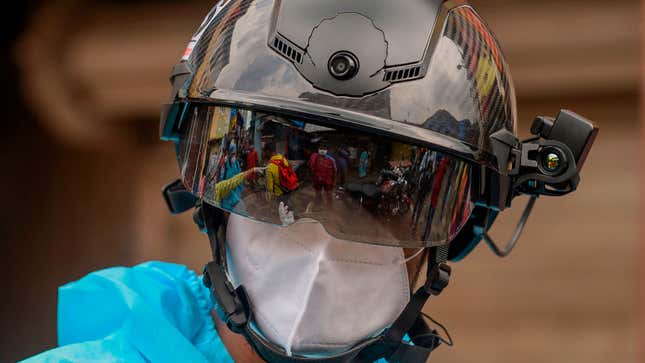
In a sort of whisper-down-the-lane approach to journalism, the New York Post on Tuesday ran an item based on a report from Friday in The Times of Israel that itself was based on a story that aired Thursday on the country’s Channel 13. The big news is that an unnamed doctor at Ramat Gan’s Sheba Medical Center reportedly tested positive for covid-19 a second time after testing negative for months in between suspected infections.
Says the Times of Israel:
According to a Channel 13 report Thursday, the unnamed medical professional contracted the virus in April during the initial coronavirus outbreak. Subsequent tests in May and June showed she no longer had the virus but after coming into contact with a COVID-19 carrier this month, she again tested positive.
Such reports are rare. The majority of previous suspected reinfections were written off as a result of tests picking up remnants of the first (and thus only) infection. Last week, CNN ran a story about a woman who tested positive in April then negative in May and then positive again later that month. As for why, CNN offers this musing:
It’s not clear that the second positive test means Hedgecock was infected again. It’s possible she initially received false negative test result or that the positive was misleading, CNN’s chief medical correspondent Sanjay Gupta said.
“We are not getting documented cases of reinfections yet ... That’s not to say they won’t come,” Gupta said. “If people were losing their immunity I think now, six months into this, we would be seeing significant amounts of reinfection.”
Some types of coronavirus tests have a 15 to 20% false negative rate, he told Cuomo Wednesday.
...Testing positive after an infection could come from the test looking for genetic material of the virus, Gupta said. The genetic material identified could be a sign that the virus is present, or it could be debris the virus left behind, he said.
The Times of Israel report did not include details about whether the suspected reinfected doctor was again experiencing symptoms, however it did include this troubling detail:
The network said that this was the second time when someone at Sheba tested positive for coronavirus after apparently recovering, citing a case of a patient who had recovered and was subsequently readmitted with pneumonia.
According to a June report in Nature Medicine, covid-19 antibodies may only last for two to three months. While they are associated with immunity, their passage (or failure to be detected via the current, unreliable tests) does not necessarily mean that someone who was infected with the novel coronavirus is automatically susceptible again. In a report on the Nature Medicine findings, the Times noted:
The conclusion does not necessarily mean that these people can be infected a second time, several experts cautioned. Even low levels of powerful neutralizing antibodies may still be protective, as are the immune system’s T cells and B cells.
In a PBS segment earlier this month, Dr. Ashish Jha, director of the Harvard Global Health Institute, said that he didn’t believe that reinfection in the short term was common (the virus simply hasn’t been in our collective understanding for long enough to have any sense of what it will mean in the long term).
“I suspect it’s rare if it happens at all,” said Jha. He said he’s reasonably confident that most of those who were infected do not get covid-19 again in the three to six months that follow. Of course, all of this is couched in suspicion and not hard data—we just don’t have it. As it has been since the virus emerged last year, it seems that the more we learn, the less we know. Many of us have restructured our lives around this unseen, as-yet-unknowable virus, and we’ve made frustratingly little headway in understanding its operation. While numbers in the U.S. skyrocket, the virus of great uncertainty rages on.